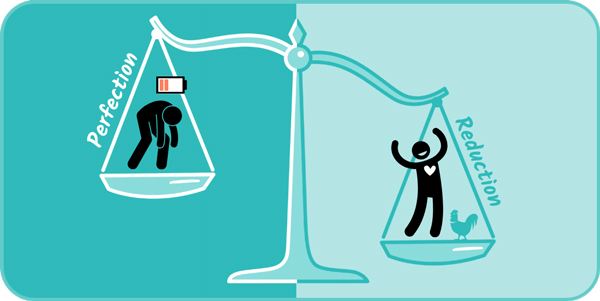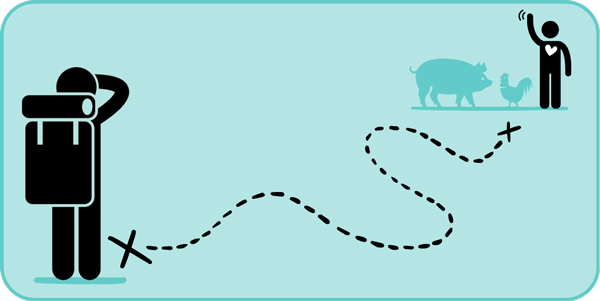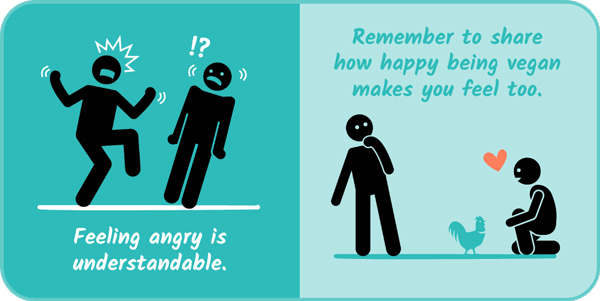By Jack Norris, Executive Director
Once you know how badly modern farming treats animals, you’ll likely want to educate the people close to you. But keep in mind that we weren’t always vegan and we’re all on our own journey.

Predicting how your friends and family will respond can be difficult. If you’re lucky, they’ll support your decision to stop eating animals, and some might join you! Others might see your veganism as an affront to their own choices.
Consider not pressuring family members to go vegan, because that’s typically the quickest way to get them to resist. Many vegans have found it best to set a good example and wait for friends and family to ask them about it.
Animal Ingredients vs. Doing the Most Good

When first going vegan, it’s common to feel the need to prove to your friends and family that it’s possible to live without animal products. Remember that the vegan ethic is a recent development. While there have been people throughout history who have preached kindness to animals, no society has been vegan. Because using animal products is deeply entrenched in industry and medicine, entirely eradicating animal ingredients from your life can be an unrealistic goal.
We recommend aiming to be about 99% vegan and using the time and emotional energy that would have gone into the final 1% to help animals in other ways. Striving to be 100% vegan could even be detrimental because it can make veganism appear too difficult. Inspire people to start eliminating animal products by pointing out that it doesn’t have to be an all-or-nothing thing and that any reduction benefits animals.
Here are some tips:
- When at restaurants with friends, eat apparently vegan foods instead of questioning the staff about minor ingredients. Some vegans don’t ask about dairy or honey in restaurant bread. Some have a rule that all movie theater popcorn is vegan enough. And some vegan parents overlook whether birthday cake at a kid’s party is vegan, though they might send their kids with a pint of nondairy ice cream.
- If someone says, “I can’t be vegan because I could never give up [insert their favorite animal product],” encourage them to eliminate all other animal products.
- If you occasionally slip up regarding your commitment to veganism, don’t let it derail your efforts. Put it behind you and keep moving forward.
- Similarly, if someone you know backslides, don’t write them off your list—each day is another day that someone can do their best to prevent animal suffering!
Some vegan advocates say it’s important to present a consistent message that humans have a moral duty towards animals and that it’s wrong to use animal products under any circumstance. Our experience is that flexibility on these issues does more good in motivating others to stick to their long-term commitments to veganism.
Remember Your Own Journey

Sometimes when people become vegan, they start having a hard time understanding why others aren’t. Once we’re aware of the suffering involved in producing animal foods, it can be challenging to remember that we were once unaware. We didn’t know, and sometimes we didn’t want to know.
Remembering our own journey to veganism makes us slower to judge and able to empathize with and engage nonvegans. Nobody is perfect, and, if our goal is to reduce animal suffering, we must keep a sense of humility when encouraging others.
The Angry Vegan Stereotype
Vegans have every right to be angry about how animals are treated.

Our anger and sense of urgency can be motivating factors for animal advocacy. But it’s also important to realize that veganism is likely to be more attractive when associated with happy people. Talk about the satisfaction you feel in making the world more compassionate.
Social Media

Social media is a valuable resource for sharing vegan information with nonvegan friends. But if you show too much graphic content about how animals are treated, your friends and family may tune you out. Be sure to mix up your content so that it includes plenty of positive information.
Rather than posting graphic photos, try posting:
- Meal photos and recipes
- Fun new products you’ve discovered
- Stories from farm animal sanctuaries
- Cute videos of rescued animals
- Photos of fun vegan events
When it Helps to Be Pushy
There’s one exception to the rule of not being pushy—when someone decides to pick on you about being vegan. If you actively try to persuade them, such as by asking them to watch videos or to read pamphlets, books, and articles, they’ll think twice about bringing up the subject again.
Conclusion
Understanding that veganism is a relatively new phenomenon and that very few of us were born vegan can provide some humility when hoping others will see our viewpoint. Being a positive example for our friends and family while at the same time providing an attainable example of veganism will do the most good.
By recognizing that veganism is a relatively new phenomenon and that very few of us were born vegan, we can stay humble when dealing with nonvegans. Being a positive example for our friends and family while at the same time providing an attainable example of veganism will do the most good!
And if you really want to make a huge impact on others, become a donor to Vegan Outreach! We use donations to reach more people who are interested in going vegan and giving them the help they need. Thank you!